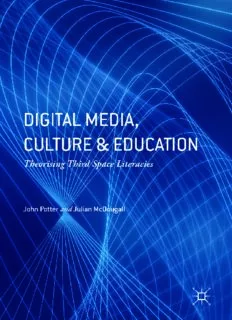
Digital Media, Culture and Education: Theorising Third Space Literacies PDF
Preview Digital Media, Culture and Education: Theorising Third Space Literacies
Digital Media, Culture and Education JohnPotter(cid:129)JulianMcDougall Digital Media, Culture and Education Theorising Third Space Literacies JohnPotter JulianMcDougall UCLKnowledgeLab BournemouthMediaSchool UniversityCollegeLondonInstitute BournemouthUniversity ofEducation Bournemouth,UK London,UK ISBN978-1-137-55314-0 ISBN978-1-137-55315-7(eBook) DOI10.1057/978-1-137-55315-7 LibraryofCongressControlNumber:2017933329 ©TheEditor(s)(ifapplicable)andTheAuthor(s)2017 Theauthor(s)has/haveassertedtheirright(s)tobeidentifiedastheauthor(s)ofthisworkin accordancewiththeCopyright,DesignsandPatentsAct1988. This work is subject to copyright. All rights are solely and exclusively licensed by the Publisher,whetherthewholeorpartofthematerialisconcerned,specificallytherightsof translation, reprinting, reuse of illustrations, recitation, broadcasting, reproduction on microfilms or in any other physical way, and transmission or information storage and retrieval,electronicadaptation,computersoftware,orbysimilarordissimilarmethodology nowknownorhereafterdeveloped. Theuseofgeneraldescriptivenames,registerednames,trademarks,servicemarks,etc.inthis publicationdoesnotimply,evenintheabsenceofaspecificstatement,thatsuchnamesare exemptfromtherelevantprotectivelawsandregulationsandthereforefreeforgeneraluse. Thepublisher,theauthorsandtheeditorsaresafetoassumethattheadviceandinformation in this book are believed to be true and accurate at the date of publication. Neither the publishernortheauthorsortheeditorsgiveawarranty,expressorimplied,withrespectto thematerialcontainedhereinorforanyerrorsoromissionsthatmayhavebeenmade.The publisherremainsneutralwithregardtojurisdictionalclaimsinpublishedmapsandinstitu- tionalaffiliations. Coverimage©AnnieKeogh Printedonacid-freepaper ThisPalgraveMacmillanimprintispublishedbySpringerNature TheregisteredcompanyisMacmillanPublishersLtd. The registered company address is: The Campus, 4 Crinan Street, London, N1 9XW, UnitedKingdom For mysister Frances,an inspirationto all ofus and remembering Tony(1927–2015)and Bernie(1928–1990) (John) For BarrieKendall–Happy 80th (Julian) This book makes a valuable contribution to the fields it inhabits, not least by refusingreductiveandeasy polaritiessuch asculture andtechnology, schooland not-school,digitalliteracyandmedialiteracy.Instead,PotterandMcDougallset up a dialogue between fields of research, concepts of literacy, and domains of practice,acooperativeratherthanadversarialmodel.Theyelaboratetheircentral ideas of third-space learning, dynamic literacies, porous expertise, and digital curation with a rich array of researched examples, showing the importance of collaborative learning in practice. This will be an essential read for lecturers, students, and practitioners hoping to understand the landscape of literacy and learninginthetwenty-firstcentury. —AndrewBurn,ProfessorofEnglish,Media,andDrama,UniversityCollege London,UK. Hereisahopefulbookaboutdynamicliteraciesineducationthatbringstolifethe livedexperienceandcreativityofyoungpeople andmakesvisible theirmeaning- makingpractices.Itsurfacesideasinwaysthataretheoreticallyandmethodologi- cally groundbreaking. This is a refreshing, hopeful, and above all, challenging book that enables, develops, and supports new thinking in media education together with literacy studies. By situating itself within cultural studies the work is re-vitalized. The book gathers together scholarship in the fields of cultural studies, digital literacies, multimodality, and new media but locates this within practice, so that the ideas come alive for educators. Acceptably written, this is a welcome addition to the field, which speaks to the cultural context of civic engagement for young people in and out of school, or ‘not-school’. Now, more than ever these voices are needed as resistance isa keypart ofsurvival for young peoplewhosemodesofparticipationneedtobestrengthenedandsupportedina challengingworld.Dynamicliteraciesarethewayforward–andthisbookarticu- latesandmapsoutapathwaythroughtoaction. —KatePahl,ProfessorofLiteraciesinEducation,UniversityofSheffield,UK. This book is for all those who realize we face new and complex problems in education today; that staying in our academic silos and engaging in business as usual will no longer do; and that digital technology can free teachers to be designers,curators,andaggregators,bringingastonishingresourcestolearnersof allagesandinallplaces.Itisamagnificentpieceofworkandabreathoffreshair. —JamesPaulGee,MaryLouFultonPresidentialProfessorofLiteracyStudies, Regents’Professor,ArizonaStateUniversity,USA. A CKNOWLEDGEMENTS Joint Acknowledgements We wrote this book together after a series of conversations about our researchandteachingoveranumberofyears.Itisajointeffort,withthe bulkofthefirsthalfbelongingmainlytoJohn,andthesecondhalfmainly to Julian. For the final chapter, however, we wanted jointly to reflect on thekeythemesrunningthroughthewholetext.Wedecidedtodothisas part of a reflective conversation between us and colleagues in the field. ThisbeganasanemailexchangewithNeilSelwynandCathyBurnettand wewouldbothliketoacknowledgethegreatcontributionstheymadeto our ‘Afterword’. They engaged fully and generously with our questions andtookonthekeythemesofthebook.WewouldliketothankMichelle Cannon and Fiona Scott for their support as our co-presenters in the conversation strand at the Media Education Summit in Rome in 2016. We would also like to thank participants in that session for permission to share their contributions: Kathleen Tyner, Ashley Woodfall, Christa Van Raalte, Anne Dawson, James Cohen, Steve Connolly and Spencer Brayton. John’sAcknowledgements JohnwouldliketothankMonashUniversityinMelbournefortheaward ofaVisitingFellowshiplastAutumn,withoutwhichhiscontributionson Dynamic literacies, Third Spaces and Curation would never have been written. In particular, he would like to acknowledge the support, good conversations and good company of members of the Learning and New Media group: Neil Selwyn, Luci Pangrazio, Michael Henderson, Scott vii viii ACKNOWLEDGEMENTS Bulfin and Selena Nemorin. Also in Australia, the encouragement of Catherine Beavis and Michael Dezuanni, talks and seminars with Graham Parr, Nicola Johnson and Julie Faulkner, and participants in the ‘Young People and the Digital’ event at the Australian Centre for the Moving Image. In London, although study leave didn’t quite go to plan forvariousreasons,JohnwouldliketoacknowledgethesupportofLesley Gourlay and Myrrh Domingo in trying to provide some space in the summer of 2016. Andrew Burn gave constant encouragement as always, asdidMichelleCannon.AlisonGazzardandthewholeMADigitalMedia team were highly supportive. The UCL Knowledge Lab, directed by Carey Jewitt, and previously by Richard Noss, is an inspiring place to work and I would like to acknowledge the great conversations down the years with colleagues there which have helped to shape my thinking. In Sheffield,inspiteofseriousillness,mysisterwasaninspiration,aswasher partner,Jimmy.Onthehomefront,inLondon,Johnwouldliketothank Janet,Alice andJack foreverything. Julian’sAcknowledgements Julian would like to thank everyone involved in the work which led to his chapters, amongst whom were: the PE department at Chew Valley School – Jo Hibbert, Phil Edwards, Dave Hill, Mandy Clarke, Gareth Jones,JackHinckley,Celia ButcherandSuzanneDaly.Julianwouldalso like to acknowledge Pete Fraser, for time served in the cause of media education and for putting up with much nonsense from him over the years. Julian also sends thanks to Alex, Lydia, Ned and Stan for all the more importantstuff. C ONTENTS 1 Foreword–Terms andConditions 1 2 DynamicLiteracies 15 3 ThirdSpaces andDigitalMaking 37 4 DigitalCuration/DigitalProduction: Storying the DigitalLearner 61 5 PorousExpertiseand PowerfulKnowledge 83 6 TheNetworked Educator andOpen Learning 107 7 CulturalStudiesGoesto Not-School:DigitalStruggles 139 8 Afterword–AnExchange withCathy Burnett, NeilSelwyn andOthers 167 References 183 Index 201 ix L F IST OF IGURES Fig.2.1 Dynamicliteraciesandpedagogicalpractices 34 Fig.6.1 Jo 133 Fig.6.2 Gareth 133 Fig.7.1 Mastersdiagram(StephenHeppell) 148 Fig.8.1 Apictureofsomeonetakingapicture 174 xi
Description: